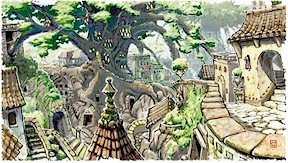
As humans measure such things, Silverymoon is a surprisingly old city. In its oldest parts (those Northbank streets just west of the Market, and closest to the river), some of the more humble buildings have stood more or less unchanged for almost six centuries -- whereas grander structures are either newer or much added to or rebuilt from their original forms.Most of "old Silverymoon" contained stout log buildings, chinked with mud and banked earth, that had grassed-over roofs. Later, permanent structures of stone replaced the log buildings, and they shared some common features: no windows or only shuttered tall-and-narrow "arrowslit" windows on the windward sides (north and northwest), plus elevated (against snowdrifts in winter) entry doors on south walls as much as possible. One entered up outside stairs that climbed those south walls from the east, into a "snow shield" shoulder-wall on the west that jutted out from the building like a buttress to give some protection against the steps icing, or bitter winds blowing in when the door was being used. Walls were thick, sometimes with an inner and an outer wall with the space between filled with rubble, and roofs were of slate-shingle or tile, steeply pitched to shed snow. Vertical ribs or fins jutting up from the plane of the roof often adorned them (as they do today) so that snow and ice were broken into narrow "chutes" when they fell, rather than huge roof-width masses that can stun or slay beings caught beneath.More modern buildings in Silverymoon often have smooth, undulating roofs that form drain channels and try to sculpt the passing winds, but among the three-story and smaller surviving buildings of old Silverymoon (usually rectangular structures that house shops at street level, with goods cellars below, and one or two floors of living apartments above) are many that share an architectural feature once very popular in the city of Silverymoon: "moon doors."Who bestowed their local name on these miniature doors is anyone's guess, but it's obviously derived from the moon which features so prominently in the city's name and legends. Moon doors have nothing directly to do with moonlight, but they could see quite a lot of use by night; they are hatches or "cat doors" set inside larger, regular (human-sized) doors -- in other words, "a door within a door."Moon doors are obviously a risk to the security of occupants and foods within a house, particularly if they lack the latches or locks common to larger doors -- and in older, more lawless times, this risk might well have been larger than it is today. Yet almost all noncivic or nonreligious buildings in the Gem of the North once boasted moon doors -- and these often possessed ornate rather than discreet features.Moon doors were used for what are still called "drops" in Silverymoon today (deliveries of packages, written messages [including payments, bills, and civic notices], and even fresh milk) as well as pet traffic. Inevitably, as time passed, such "pets" included unwelcome intruding creatures trained and sent by spies and thieves.With the prevalence of both magic and large, beautiful glass windows in the Gem of the North today, forcible entries of small creatures are both possible and more likely than in the smaller, more wary Silverymoon of old. However, the moon door has fallen out of fashion with modern builders, who are more apt to hide a completely separate hatch or mini-door behind entrance-flanking sculpted beasts or pillars, or between columns that protrude from (but aren't separate from) a wall, rather than cutting a small door right through the material of a larger door.Often, illusion spells or clever relief carvings hide moon doors that do exist in recently built structures of Silverymoon, and the doors also likely permit entrance not right into the interior, but into a stone-lined storage cavity that has a second (stoutly locked and bolted or barred) interior door, plus a glass- or mica-covered spyhole, connecting to the inside of the building. Thus, things that come through the door can be examined before admitting them wholly. Also, at the very least, someone can't use a moon door to fire an arrow or crossbow bolt right into the body of someone just inside the door (the old "knock and fire" attack).
By Ed Greenwood

No comments:
Post a Comment